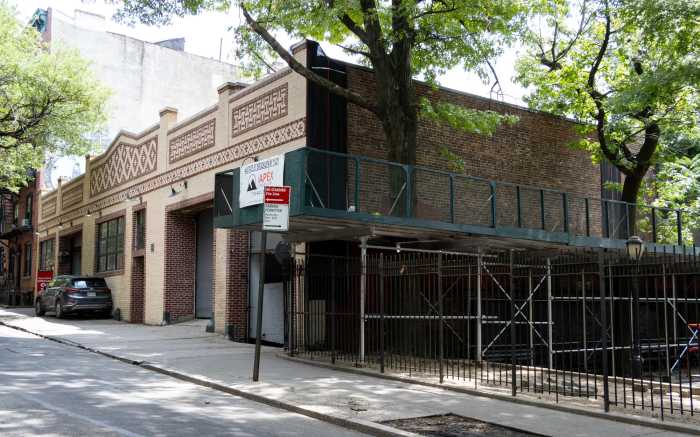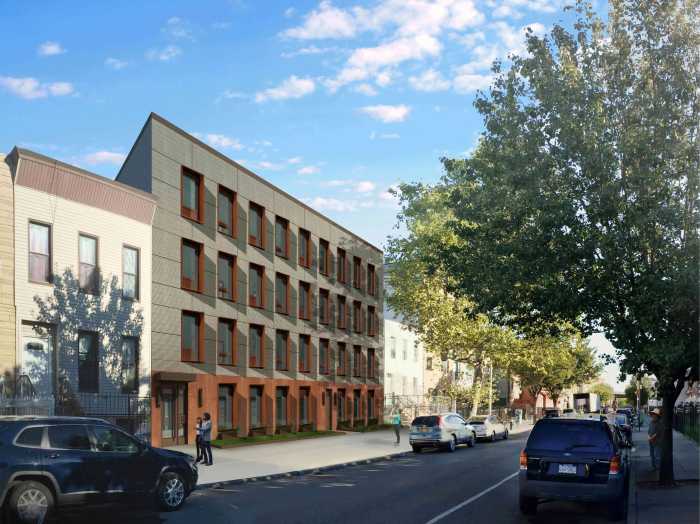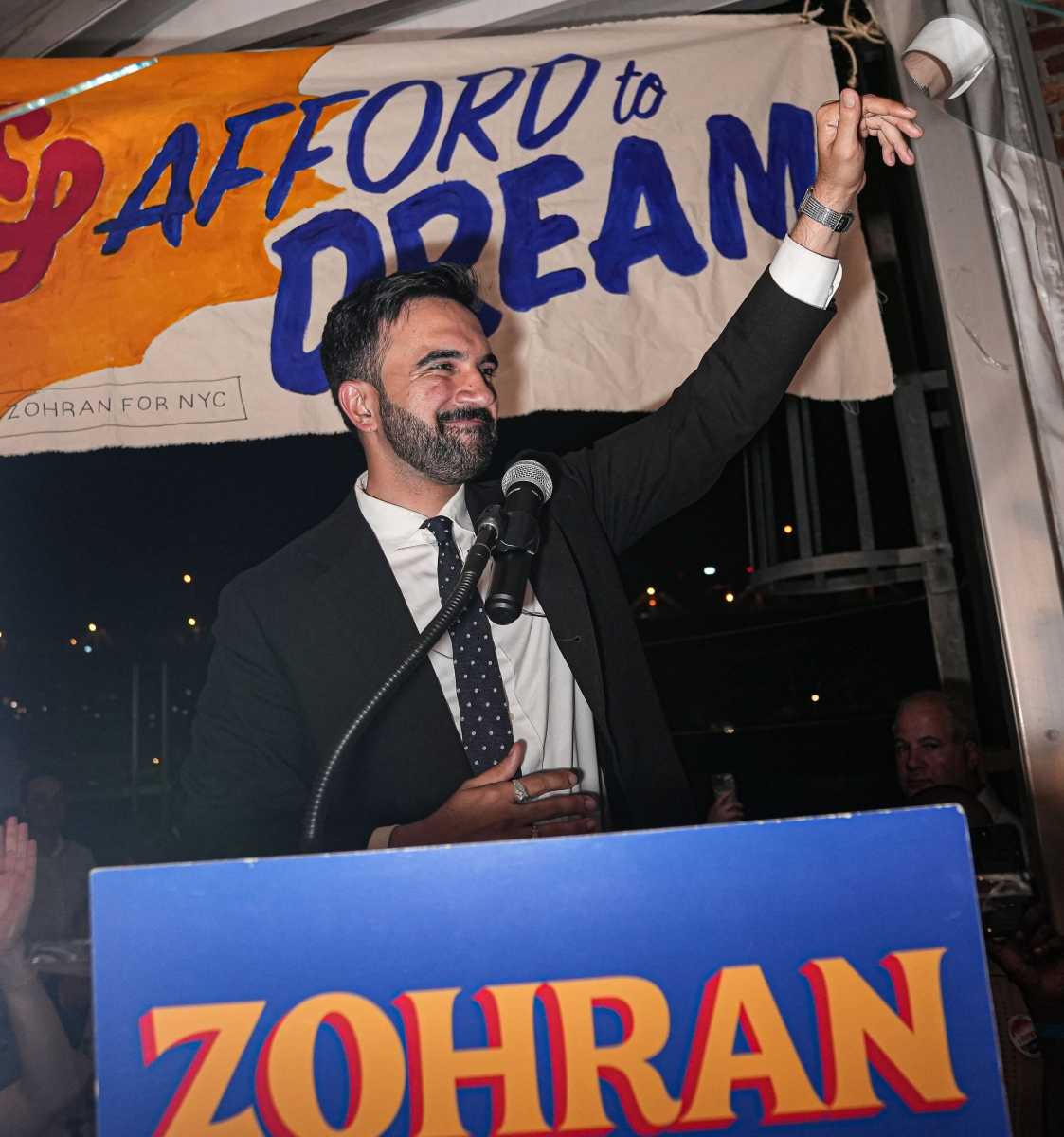A U.S. judge says federal courts should toss out a lawsuit by property owners and tenants facing eviction for Bruce Ratner’s 16-skycraper-and-arena mini-city — a blow to opponents that legal experts said could mark the beginning of the end of the legal challenge to the $4-billion project.
Brooklyn federal court magistrate Robert Levy wrote last Friday that the case should be sent to state court because “eminent domain is traditionally a matter of local concern.”
That’s a huge setback to the plaintiffs, who filed their case in federal, rather than state, court because New York’s legal system is typically unsympathetic to challenges to the government’s right to condemn property via eminent domain.
Levy could still be overruled by the federal district judge overseeing the case, but recommendations by magistrates are rarely rejected, experts said.
“[Staying in the federal court] was the plaintiffs’ biggest hurdle and obviously they are not getting over it,” said Michael Rikon, an attorney who specializes in condemnation law.
Rikon’s firm represented tenants and owners who lost property to Ratner’s first Brooklyn project, Metrotech, as well as to the developer’s New York Times Building in Times Square.
The lawyer said that state condemnation law would have to change before constitutional challenges, like that of the Atlantic Yards opponents, will have a fair shake.
The suit, filed last year by 12 residents and the owner of Freddy’s Bar, charges that Ratner (left) and his partners in government broke the law when they seized private property to make room for the developer’s Prospect Heights Xanadu.
In large part, the case rests on a sequence of alleged cronyism that led to the MTA’s decision to sell its Long Island Rail Road yards to Ratner for $100 million less than its appraised value.
That decision was made after Deputy Mayor Daniel Doctoroff sent a memo declaring the city would back only the Ratner plan, the lawsuit said.
The Doctoroff memo is seen by many Atlantic Yards opponents as the “smoking gun” that shows that the state illegally favored the developer.
Other claims outline alleged shortcomings in last year’s state-mandated sequence of public hearings and reviews of the project.
Mayor Bloomberg; Doctoroff; Ratner; the developer’s executives; state development officials who shepherded the project through the approval process; and even Ratner’s college buddy, former Gov. Pataki, are all named in the suit.
Rikon and other legal experts said state judges ruling on eminent domain cases typically don’t favor small businesses, or groups of residents like the one represented in the suit, which is led by Develop Don’t Destroy Brooklyn spokesman Daniel Goldstein, the last holdout in a Pacific Street condo building that must be torn down to make room for Ratner’s proposed arena.
“The laws make it tough no matter what track you are on, as long as you are in New York,” said Steven Anderson, director of the anti-eminent domain Institute for Justice Castle Coalition.
“In state courts,” he added, “it’s tougher”
Unlike federal courts, New York’s courts don’t permit plaintiffs to seek the legal search warrant, called “discovery,” that allows them to dig through e-mails and other correspondence between defendants in the case.
The importance of this license to dig has been clear since Goldstein’s lawyer Matthew Brinckerhoff asked, in early December, that the courts expedite access to the potentially powerful communications.
When he asked the court to expedite his access to the potentially powerful candid correspondence, one lawyer for the Empire State Development Corporation slammed the case as a “fishing expedition.” Other legal experts noted that the access was critical to the case’s success, as it was the clearest opportunity to score other “smoking gun” documents that would prove Ratner and his alleged cronies had broken the law.
“If we end in state court, our appeal will be limited to [evidence of wrong-doing found in] the public record,” said Jennifer Levy, a South Brooklyn Legal Services attorney who is representing some of the residents of the project footprint named in the suit.
“But we are talking about the intent,” said Levy said, who is no relation to the magistrate. “And intent is a hard thing to uncover without evidence of [internal] communications.”
In his opinion, Magistrate Levy agreed that the loss of digging rights would be a blow.
“Plaintiffs have good reasons for preferring federal court over state court, not the least of which is the lack of access to discovery in state court proceedings…,” he wrote.
He did make it clear that the case should be heard in a court — but just not his.
“The complaint raises serious and difficult questions regarding the exercise of eminent domain under emerging Supreme Court jurisprudence,” Levy said.
Both sides have until next Wednesday to submit additional papers to Judge Nicholas Garaufis, who will make the final decision.
If Garaufis agrees with the magistrate’s recommendation, Brinckerhoff and Levy can appeal in a lower federal court or refile in the New York State Supreme Court.
Brinckerhoff said he remained confident that his constitutional challenge will prevail, even if does move to state court.
“We have a simple claim: You are entitled to an impartial arbiter [when your property is condemned],” he said, “Our allegation is that the outcome was predetermined a long time ago.”
























